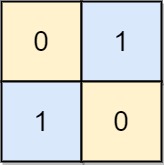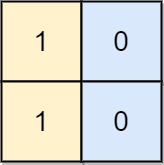Algorithm
Problem Name: 782. Transform to Chessboard
You are given an n x n binary grid board. In each move, you can swap any two rows with each other, or any two columns with each other.
Return the minimum number of moves to transform the board into a chessboard board. If the task is impossible, return -1.
A chessboard board is a board where no 0's and no 1's are 4-directionally adjacent.
Example 1:

Input: board = [[0,1,1,0],[0,1,1,0],[1,0,0,1],[1,0,0,1]] Output: 2 Explanation: One potential sequence of moves is shown. The first move swaps the first and second column. The second move swaps the second and third row.
Example 2:

Input: board = [[0,1],[1,0]] Output: 0 Explanation: Also note that the board with 0 in the top left corner, is also a valid chessboard.
Example 3:

Input: board = [[1,0],[1,0]] Output: -1 Explanation: No matter what sequence of moves you make, you cannot end with a valid chessboard.
Constraints:
n == board.lengthn == board[i].length2 <= n <= 30board[i][j]is either0or1.
Code Examples
#1 Code Example with Javascript Programming
Code -
Javascript Programming
const movesToChessboard = function (b) {
let N = b.length,
rowSum = 0,
colSum = 0,
rowSwap = 0,
colSwap = 0;
for (let i = 0; i < N; ++i)
for (let j = 0; j < N; ++j)
if ((b[0][0] ^ b[i][0] ^ b[0][j] ^ b[i][j]) === 1) return -1;
for (let i = 0; i < N; ++i) {
rowSum += b[0][i];
colSum += b[i][0];
if (b[i][0] === i % 2) rowSwap++;
if (b[0][i] === i % 2) colSwap++;
}
if (rowSum !== ((N / 2) >> 0) && rowSum !== ((N + 1) / 2)>>0 ) return -1;
if (colSum !== ((N / 2) >> 0) && colSum !== ((N + 1) / 2)>>0 ) return -1;
if (N % 2 === 1) {
if (colSwap % 2 === 1) colSwap = N - colSwap;
if (rowSwap % 2 === 1) rowSwap = N - rowSwap;
} else {
colSwap = Math.min(N - colSwap, colSwap);
rowSwap = Math.min(N - rowSwap, rowSwap);
}
return (colSwap + rowSwap) / 2;
};
Input
Output
#2 Code Example with Python Programming
Code -
Python Programming
class Solution:
def movesToChessboard(self, b):
N = len(b)
if any(b[0][0] ^ b[i][0] ^ b[0][j] ^ b[i][j] for i in range(N) for j in range(N)): return -1
if not N // 2 <= sum(b[0]) <= (N + 1) // 2: return -1
if not N // 2 <= sum(b[i][0] for i in range(N)) <= (N + 1) // 2: return -1
col = sum(b[0][i] == i % 2 for i in range(N))
row = sum(b[i][0] == i % 2 for i in range(N))
if N % 2:
if col % 2: col = [col, N - col][col % 2]
if row % 2: row = N - row
else:
col = min(N - col, col)
row = min(N - row, row)
return (col + row) // 2
Input
Output
